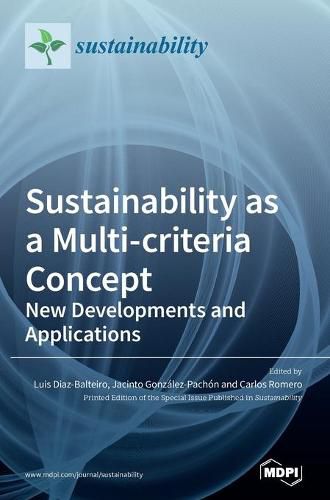Readings Newsletter
Become a Readings Member to make your shopping experience even easier.
Sign in or sign up for free!
You’re not far away from qualifying for FREE standard shipping within Australia
You’ve qualified for FREE standard shipping within Australia
The cart is loading…






This title is printed to order. This book may have been self-published. If so, we cannot guarantee the quality of the content. In the main most books will have gone through the editing process however some may not. We therefore suggest that you be aware of this before ordering this book. If in doubt check either the author or publisher’s details as we are unable to accept any returns unless they are faulty. Please contact us if you have any questions.
Sustainability is a fairly old concept, born in the 18th century in the field of forestry, within a mono-functionality perspective. The concept has considerably evolved in the last few years towards a multi-functionality context, with applications reported in practically all areas of economic interest. On the other hand, modern sustainability is a complex problem, for two reasons: a) The multiplicity of functions of a very different nature involved in the process and b) The manner in which different segments of the society or stakeholders perceive the relative importance of these functions. For the above reasons, a realistic approach for dealing with the sustainability issue requires taking into consideration multiple criteria of different nature (economic, environmental and social), and in many cases within a participatory decision making framework. This book presents a collection of papers, dealing with different theoretical and applied issues of sustainability, with the help of a modern multi-criteria decision-making theory, with a single as well as several stakeholders involved in the decision-making process. Hopefully, this material will encourage academics and practitioners to alter their research in this hot and vital topic. After all, the sustainable management of the environment and its embedded resources is one of the most important, if not the major challenge of the 21st century.
$9.00 standard shipping within Australia
FREE standard shipping within Australia for orders over $100.00
Express & International shipping calculated at checkout
This title is printed to order. This book may have been self-published. If so, we cannot guarantee the quality of the content. In the main most books will have gone through the editing process however some may not. We therefore suggest that you be aware of this before ordering this book. If in doubt check either the author or publisher’s details as we are unable to accept any returns unless they are faulty. Please contact us if you have any questions.
Sustainability is a fairly old concept, born in the 18th century in the field of forestry, within a mono-functionality perspective. The concept has considerably evolved in the last few years towards a multi-functionality context, with applications reported in practically all areas of economic interest. On the other hand, modern sustainability is a complex problem, for two reasons: a) The multiplicity of functions of a very different nature involved in the process and b) The manner in which different segments of the society or stakeholders perceive the relative importance of these functions. For the above reasons, a realistic approach for dealing with the sustainability issue requires taking into consideration multiple criteria of different nature (economic, environmental and social), and in many cases within a participatory decision making framework. This book presents a collection of papers, dealing with different theoretical and applied issues of sustainability, with the help of a modern multi-criteria decision-making theory, with a single as well as several stakeholders involved in the decision-making process. Hopefully, this material will encourage academics and practitioners to alter their research in this hot and vital topic. After all, the sustainable management of the environment and its embedded resources is one of the most important, if not the major challenge of the 21st century.